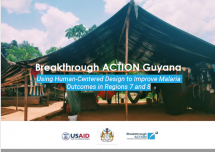Using Human-Centered Design to Improve Malaria Outcomes in Regions 7 and 8
Breakthrough ACTION Guyana is the United States Agency for International Development’s flagship social and behavior change (SBC) project designed to improve malaria outcomes among priority populations. The project uses innovative SBC approaches to address key behaviors related to malaria testing and treatment.
In Guyana, malaria is an issue in Regions 1, 7, 8, and 9, particularly among gold mining populations. In response, the Ministry of Public Health (MOPH), the Pan American Health Organization, and the Global Fund to Fight AIDS, Tuberculosis and Malaria have introduced malaria rapid diagnostic tests (RDTs) to provide services in hard-to-reach areas.
During the Define phase, two research teams conducted qualitative research in Regions 7 and 8 to better understand care-seeking behaviors around malaria testing and treatment among miners. Eleven insights were developed from the initial findings, which were used to inform the Design & Test phase. The Design & Test phase was a highly iterative process that translated problems into solutions through idea generation and prioritization, prototyping, user testing with key audiences in context, learning, and improving. More than 790 ideas were initially generated from a cross-section of stakeholders. These ideas were ultimately categorized into eight broad concepts under which various low-fidelity prototypes were developed and tested with 145 people in Regions 7 and 8.
Rapidly building and testing tangible, low-fidelity versions of each concept provided valuable, early user feedback that helped to refine or abandon design ideas. This resulted in savings in time and money on solutions that did not meet the needs of users or deliver on intended outcomes.
Five design prototypes that showed the most merit during user testing will be reviewed for a pilot and then considered for implementation in the Apply phase.
Source: Johns Hopkins Center for Communication Programs
Date of Publication: July 12, 2019

